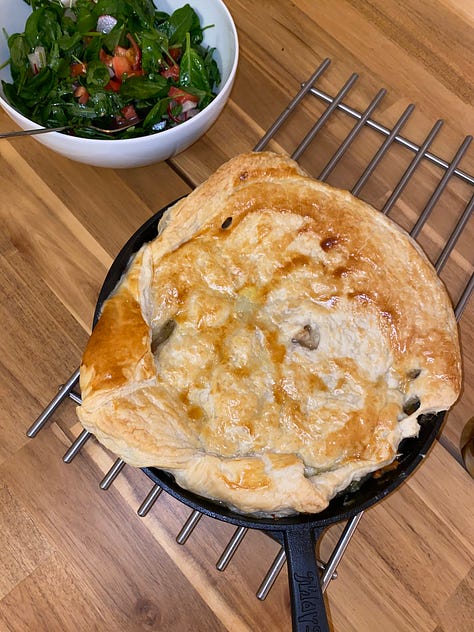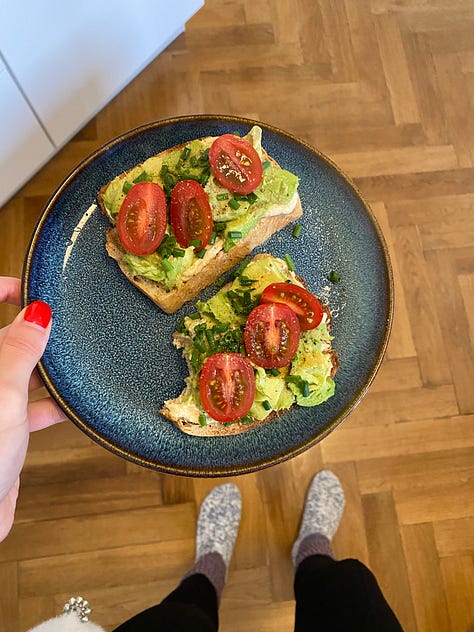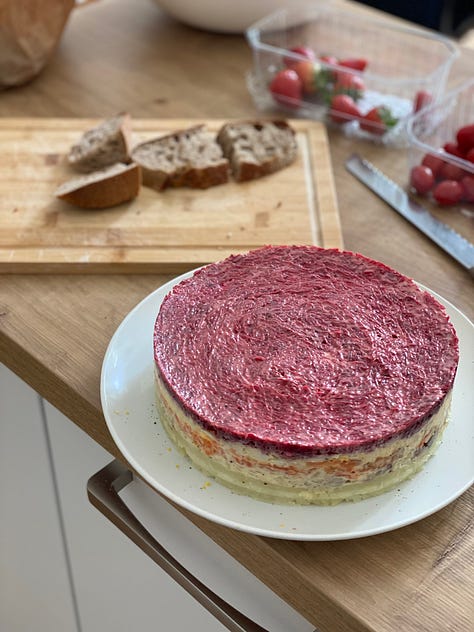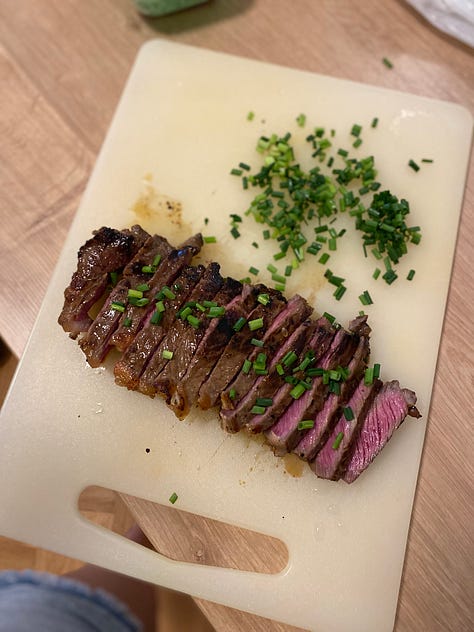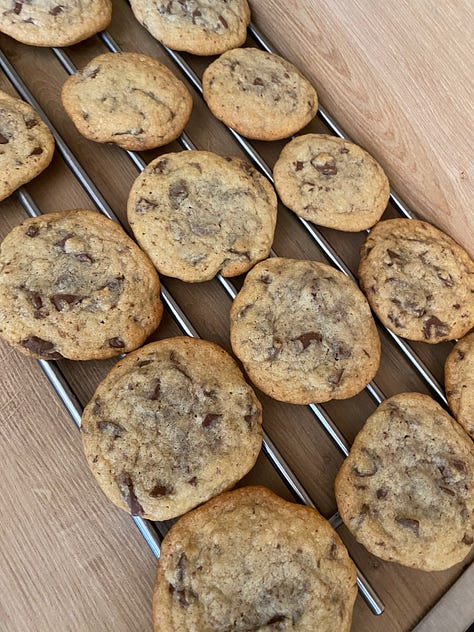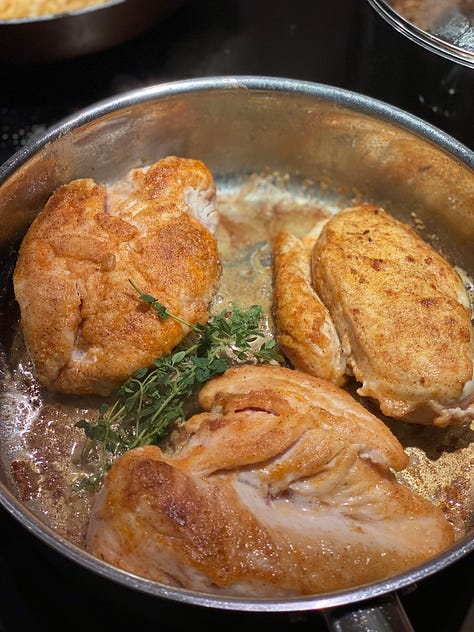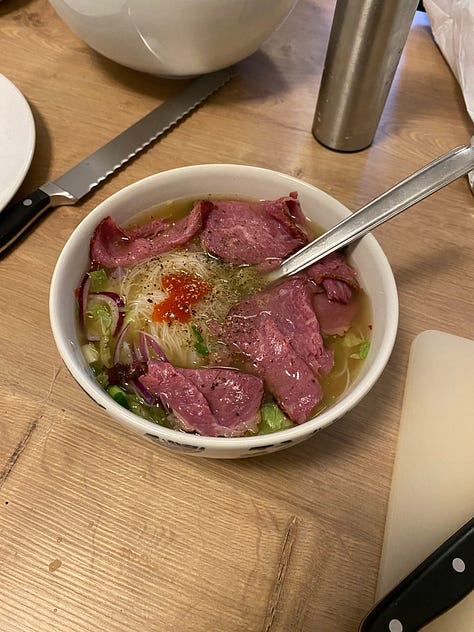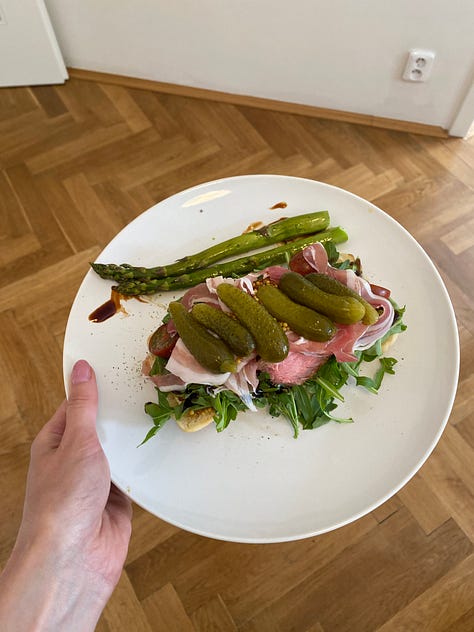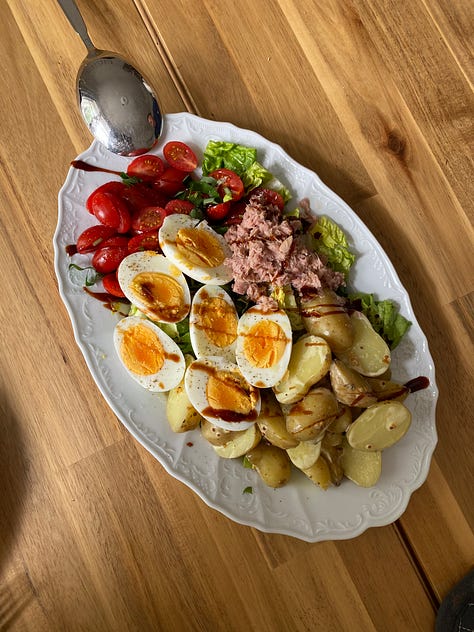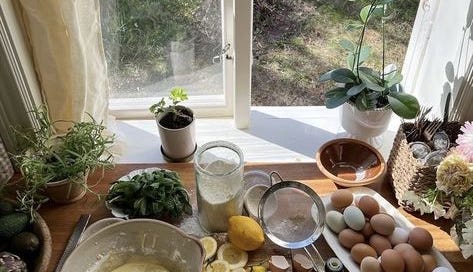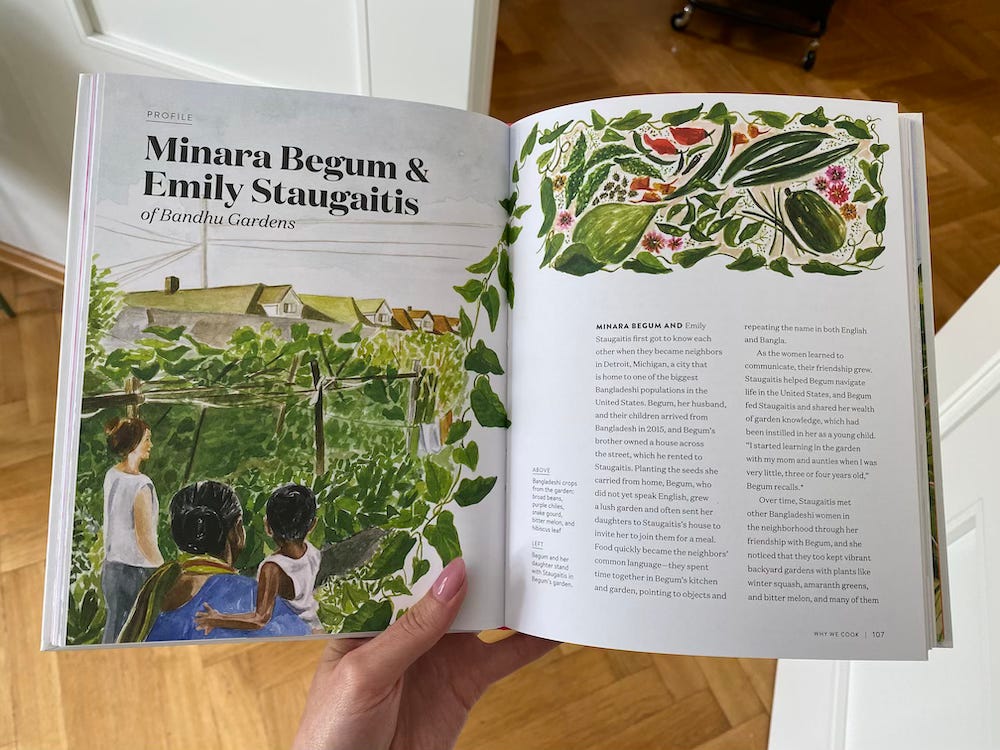The Issue is a bit of Ctrl Create with an obsessive list of theme specific recommendations.
In my kitchen, I try to practice mindful eating — cooking from scratch, using seasonal and locally-sourced ingredients, minimizing food waste by preserving and fermenting, not always successfully, of course. “I begin with the proposition that eating is an agricultural act,” Wendell Berry wrote. “Eating ends the annual drama of the food economy that begins with planting and birth. Most eaters, however, are no longer aware that this is true. They think of food as an agricultural product, perhaps, but they do not think of themselves as participants in agriculture. They think of themselves as “consumers.” Ever since reading this essay, I have spent a great deal of energy trying to honor the agricultural cycle, understand where food comes from, learn how the techniques were created, and also — recognize who suffered. I learned that my favorite broccoli was created from wild cabbage, that honey stored correctly could last forever, and that the ancient Egyptians were the first to realize the preservation possibilities of salt. Later on, salt would play a huge role in determining the power of cities. I could go on and on. The history of food is as fascinating as the history of the world itself.
There is the production of food and cooking, and then there is eating. Michael Pollan, one of my favourite food writers said: “Eat food. Not too much. Mostly plants.” and also “Don't eat anything incapable of rotting.” This seems like a good advice to live by and yet there are so many nuances.
What I am trying to say is — I don’t want to be a passive consumer, I want to be an active participant in agriculture, and I hope you do too.
Food Writing and Culture
🍞 "The Gastronomical Me" by M.F.K. Fisher - A collection of essays by one of the most revered food writers, reflecting on her life and relationship with food.
People ask me: Why do you write about food, and eating and drinking? Why don’t you write about the struggle for power and security, about love, the way others do? The easiest answer is to say that, like most other humans, I am hungry. But there is more than that. It seems to me that our three basic needs for food and security and love, are so mixed and mingled and entwined that we cannot straightly think of one without the others. So it happens that when I write of hunger, I am really writing about love and the hunger for it. There is communion of more than our bodies when bread is broken and wine drunk.
🥧 "An Everlasting Meal: Cooking with Economy and Grace" by Tamar Adler - A book that offers a philosophy of cooking that emphasizes simplicity and resourcefulness.
Food is what I love, and how I communicate love, and how I calm myself.
There is great value in being able to say "yes" when people ask if there is anything they can do. By letting people pick herbs or slice bread instead of bringing a salad, you make your kitchen a universe in which you can give completely and ask for help. The more environments with that atmospheric makeup we can find or create, the better.
🍴 "Consider the Fork: A History of How We Cook and Eat" by Bee Wilson - A history of cooking tools and techniques and their impact on how we eat.
Every new technology represents a trade-off: something is gained, but something is also lost.
🍽️ "The Third Plate: Field Notes on the Future of Food" by Dan Barber - A look at the future of food and sustainable agriculture by the chef of Blue Hill at Stone Barns.
Modern agriculture has thoroughly separated the agri from the culture. They’ve killed the meaning of the word—bifurcated it, completely, in just the last thirty or so years.
🥘 "In Defense of Food: An Eater's Manifesto" by Michael Pollan - Pollan’s argument for a simpler and more mindful approach to eating.
Don't eat anything incapable of rotting.
He showed the words “chocolate cake” to a group of Americans and recorded their word associations. “Guilt” was the top response. If that strikes you as unexceptional, consider the response of French eaters to the same prompt: “celebration.”
🧂 "Salt: A World History" by Mark Kurlansky - A history of salt and its impact on civilization.
Salt is so common, so easy to obtain, and so inexpensive that we have forgotten that from the beginning of civilization until about 100 years ago, salt was one of the most sought-after commodities in human history.
The Roman army required salt for its soldiers and for its horses and livestock. At times soldiers were even paid in salt, which was the origin of the word salary and the expression “worth his salt” or “earning his salt.” In fact, the Latin word sal became the French word solde, meaning pay, which is the origin of the word, soldier.
I did some digging, and there are conflicting opinions on the etymology of the word, but it still makes for a good story.
🐟 "Cod: A Biography of the Fish that Changed the World" by Mark Kurlansky - The story of the codfish and its influence on history, economy, and culture.
Man wants to see nature and evolution as separate from human activities. There is a natural world, and there is man. But man also belongs to the natural world. If he is a ferocious predator, that too is part of evolution. If cod and haddock and other species cannot survive because man kills them, something more adaptable will take their place. Nature, the ultimate pragmatist, doggedly searches for something that works. But as the cockroach demonstrates, what works best in nature does not always appeal to us.
🥬 "The Botany of Desire: A Plant's-Eye View of the World" by Michael Pollan - An exploration of the relationship between humans and plants, including a section on the apple and its impact on agriculture.
Design in nature is but a concatenation of accidents, culled by natural selection until the result is so beautiful or effective as to seem a miracle of purpose.
🥭 "Climbing the Mango Trees: A Memoir of a Childhood in India" by Madhur Jaffrey - A memoir by the renowned Indian chef and actress, focusing on her childhood and the food traditions of her family.
When I left India to study in England, I could not cook at all, but my palate had already recorded millions of flavors. From cumin to ginger, they were all in my head, waiting to be called into service.
🍜 "Why We Cook: Women on Food, Identity, and Connection" by Lindsay Gardner is a beautifully illustrated and thoughtfully curated collection of essays, interviews, and artwork celebrating the diverse voices and experiences of women in the culinary world. The book features contributions from chefs, writers, food activists who share their personal stories, reflections, and recipes, exploring how food intersects with their identities, cultures, and communities. It’s and ode to the significance of cooking beyond just sustenance.
Novels About Food
❤️ "Heartburn" by Nora Ephron - A semi-autobiographical novel about a cookbook writer who discovers her husband is having an affair while she is seven months pregnant. Filled with Ephron's trademark wit and recipes. One of my favourite books to read when I am feeling blue.
🍷 "Sweetbitter" by Stephanie Danler - A coming-of-age story about a young woman who moves to New York City and gets a job at a prestigious restaurant, learning about love, lust, and the high-paced life of the restaurant industry.
🥘 "The Hundred-Foot Journey" by Richard C. Morais - The story of a young Indian boy who becomes a renowned chef in France after his family opens a restaurant across the street from a Michelin-starred French restaurant.
🍫 "Chocolat" by Joanne Harris - A novel about a woman and her daughter who open a chocolate shop in a small French village, transforming the lives of the townspeople with their confections.
🍩 "Delicious!" by Ruth Reichl - A novel about a young woman who moves to New York to work for a food magazine and uncovers a hidden trove of letters from a plucky 12-year-old to the legendary chef James Beard.
🍞 "Bread Alone" by Judith Ryan Hendricks - After her marriage falls apart, a woman finds solace and purpose working in a bakery, where she rediscovers her passion for life and baking.
🍝 "Recipe for a Perfect Wife" by Karma Brown - A dual narrative about a modern woman and a 1950s housewife, connected through an old cookbook and the recipes they both use.
🍎 "Pomegranate Soup" by Marsha Mehran - The story of three Iranian sisters who open a café in a small Irish town, bringing their rich culinary traditions to their new home.
Essays
The Pleasures of Eating by Wendell Berry
Learning to Cook for One by Gina Mei — “Can loneliness be taught? Can it become a habit? Can it be unlearned?”
This Cookbook from 1942 Is a Textbook for Making a Better World by Abby Walthausen
The Food Wars by Amos Zeeberg
My Family’s Daily Struggle to Find Food in Gaza by Mosab Abu Toha
Tell Me Why the Watermelon Grows By Jori Lewis — “Of course, the watermelon itself is not to blame, but throughout its botanical, cultural, and social history, it has been a vehicle for our ideas about community, survival, and what we owe the future.”
Could Mushrooms Be the Drug to Finally Cure Eating Disorders? By Megan Zhang
Movies and TV Series
Julie and Julia - The story of Julia Child and Julie Powell's culinary adventures, my favorite when it comes to cooking and food writing.
Sweetbitter - Based on the novel by Stephanie Danler, it follows a young woman who starts working at a prestigious restaurant in New York City.
The Bear - A drama series about a young chef from the fine dining world who comes home to Chicago to run his family's sandwich shop.
On the Verge - A TV series created by Julie Delpy that follows the lives of four women in their late forties, one of them a chef and a cookbook author.
Ratatouille - An animated film about a rat named Remy who dreams of becoming a great French chef despite his family's wishes and the obvious problem of being a rat in a decidedly rodent-phobic profession.
Chef - A chef who loses his restaurant job starts up a food truck in an effort to reclaim his creative promise, while piecing back together his estranged family.
Some of the Things I Made This Month
I spent a good portion of the month travelling so wasn’t cooking much, yet here are some of my favourite foods: chicken pod pie (nothing better on a rainy day), Russian herring under the fur coat salad (like eating a cloud), chocolate chip cookies, and other wonderful things.
